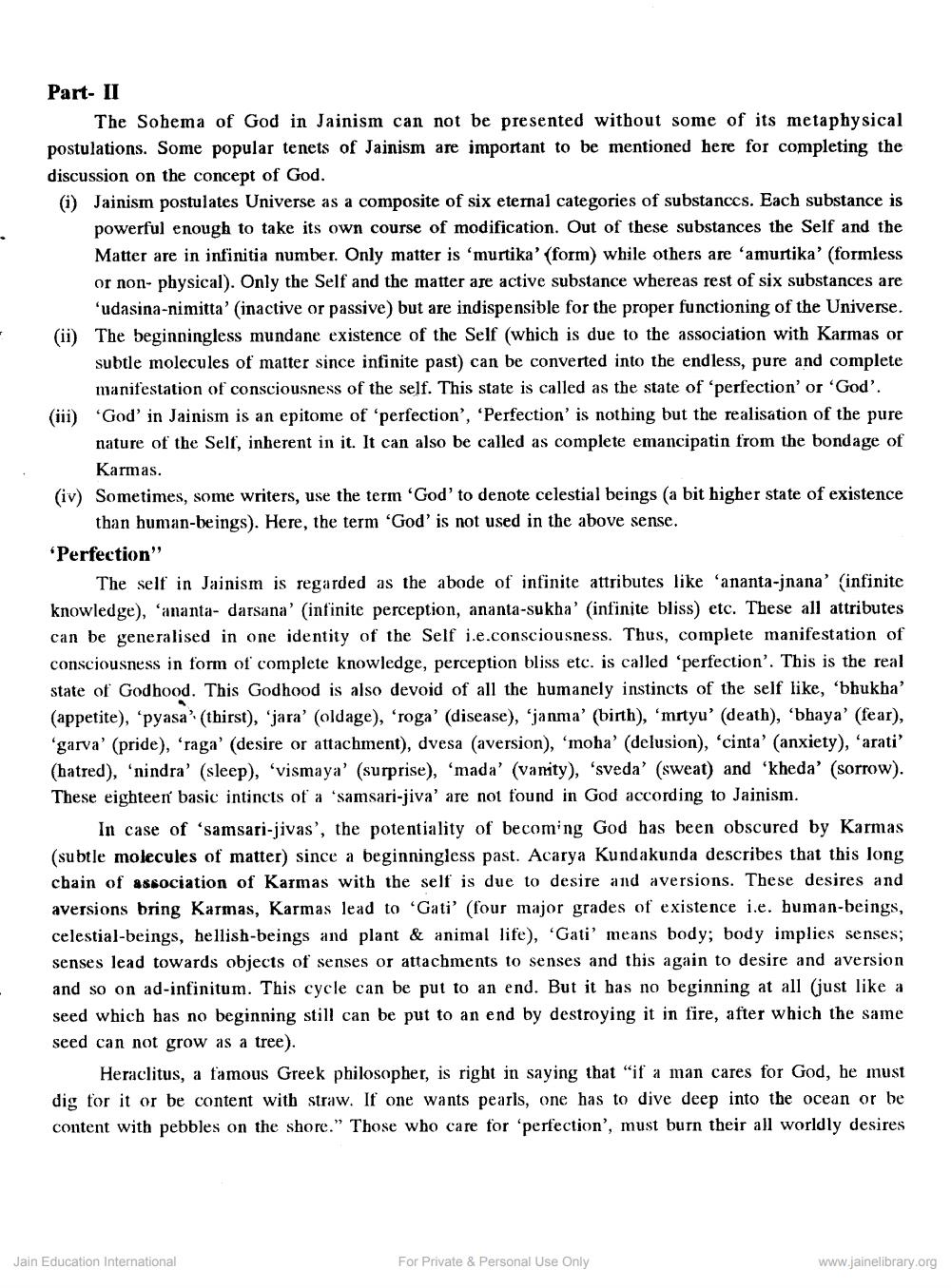________________
Part II
The Sohema of God in Jainism can not be presented without some of its metaphysical postulations. Some popular tenets of Jainism are important to be mentioned here for completing the discussion on the concept of God. (i) Jainism postulates Universe as a composite of six eternal categories of substances. Each substance is
powerful enough to take its own course of modification. Out of these substances the Self and the Matter are in infinitia number. Only matter is 'murtika' (form) while others are 'amurtika' (formless or non-physical). Only the Self and the matter are active substance whereas rest of six substances are
"udasina-nimitta' (inactive or passive) but are indispensible for the proper functioning of the Universe. (ii) The beginningless mundane existence of the Self (which is due to the association with Karmas or
subtle molecules of matter since infinite past) can be converted into the endless, pure and complete
manifestation of consciousness of the self. This state is called as the state of “perfection' or 'God'. (iii) 'God' in Jainism is an epitome of 'perfection', 'Perfection' is nothing but the realisation of the pure
nature of the Self, inherent in it. It can also be called as complete emancipatin from the bondage of
Karmas. (iv) Sometimes, some writers, use the term 'God' to denote celestial beings (a bit higher state of existence
than human-beings). Here, the term 'God' is not used in the above sense, 'Perfection"
The self in Jainism is regarded as the abode of infinite attributes like 'ananta-jnana' infinite knowledge), ananta- darsana' infinite perception, ananta-sukha' (infinite bliss) etc. These all attributes can be generalised in one identity of the Self i.e.consciousness. Thus, complete manifestation of consciousness in form of complete knowledge, perception bliss etc. is called 'perfection'. This is the real state of Godhood. This Godhood is also devoid of all the humanely instincts of the self like, 'bhukha' (appetite), 'pyasa? (thirst), 'jara' (oldage), roga' (disease), “janma' (birth), 'mrtyu' (death), 'bhaya' (fear), 'garva' (pride), ‘raga' (desire or attachment), dvesa (aversion), 'moha' (delusion), 'cinta' (anxiety), ‘arati' (hatred), 'nindra' (sleep), 'vismaya' (surprise), 'mada' (vanity), 'sveda' (sweat) and 'kheda' (sorrow). These eighteen' basic intincts of a 'samsari-jiva' are not found in God according to Jainism.
In case of 'samsari-jivas', the potentiality of becoming God has been obscured by Karmas (subtle molecules of matter) since a beginningless past. Acarya Kundakunda describes that this long chain of association of Karmas with the self is due to desire and aversions. These desires and aversions bring Karmas, Karmas lead to 'Gati' (four major grades of existence i.e. human-beings, celestial-beings, hellish-beings and plant & animal life), "Gati' means body; body implies senses; senses lead towards objects of senses or attachments to senses and this again to desire and aversion and so on ad-infinitum. This cycle can be put to an end. But it has no beginning at all (just like a seed which has no beginning still can be put to an end by destroying it in fire, after which the same seed can not grow as a tree).
Heraclitus, a famous Greek philosopher, is right in saying that "if a man cares for God, he must dig for it or be content with straw. If one wants pearls, one has to dive deep into the ocean or be content with pebbles on the shore." Those who care for 'perfection', must burn their all worldly desires
Jain Education International
For Private & Personal Use Only
www.jainelibrary.org




